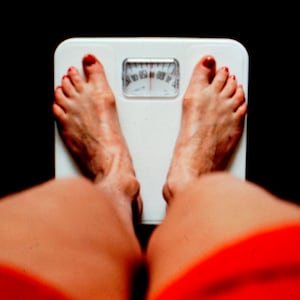Ariana Grande is no stranger to addressing toxic fandom. In her years as an A-list pop diva, the “thank u, next” singer has been forced to defend herself from slut-shamers, rumors about her being difficult to work with, and even accusations that she milked her ex-partner Mac Miller’s death for attention. Now, Grande is urging social media users to stop commenting on her body following intense online speculation that she has an eating disorder.
“I think we should be gentler and less comfortable commenting on people’s bodies no matter what,” the 29-year-old said in a TikTok posted Tuesday night. “If you think you’re saying something good or well-intentioned, whatever it is—healthy, unhealthy, big, small, this, that, sexy, not sexy—we just shouldn’t. We should really work toward not doing that as much.”
In the three-minute video, which has now been viewed over 55 million times, the singer and actress gently reminded fans that they “never know what someone is going through.” She also dispelled the notion that she was “healthier” in the old photos that some people have been comparing her to.
“The body that you have been comparing my current body to was the unhealthiest version of my body,” Grande explained. “I was on a lot of antidepressants and drinking on them and eating poorly and at the lowest point of my life when I looked the way you consider my ‘healthy.’ But that, in fact, wasn’t my ‘healthy.’”
The former Nickelodeon star has been noticeably more withdrawn from the public while shooting her upcoming musical film Wicked, in which she plays the role of Glinda. However, recent Instagram photos and TikTok videos of Grande have prompted a slew of invasive remarks from fans and random spectators, most notably rampant claims that she might be anorexic.
This conversation has been especially robust on Reddit, where newly posted photos of Grande invite the most presumptuous takes. One particular thread, prompted by a photo of Grande with her Wicked co-star Cynthia Erivo, shows a number of comments that have been removed by the site’s monitors for “overly invasive health discussion.” Another recent image of Grande posted in the subreddit r/VindicaRateCelebs elicited a number of reactions from users expressing concern over her thinness and suggesting she’s “sick.”
Maybe it’s the fact that fans have seen much less of Grande over the past year, or her dramatic transformation as a bleach-blonde Glinda, that’s made fans put her appearance under a microscope. Social media has also recently made a big deal about the disappearance of her tan, which became the subject of “blackfishing” discourse around the release of her 2019 album thank u, next.
Nevertheless, the comments surrounding Grande’s alleged eating habits are undoubtedly strange, inappropriate, and insulting to the already overly scrutinized singer. Not to mention, such open and careless discussion of a sensitive subject is hardly beneficial to onlookers who may be dealing with their own body image issues.
The Grande discourse is just one of many tasteless conversations about celebrities’ bodies that have been brewing online and that have ignited sexist and fatphobic discourse for decades. But amid Hollywood’s Ozempic craze over the past few months, there’s been an unsettling uptick in social media users openly suspecting which actors and musicians are suffering from eating disorders in a less-than-caring tone.
Last month’s Oscars ceremony was a prime example of Twitter users overstepping boundaries as they flippantly accused celebrities like Mindy Kaling and Lady Gaga of taking the diabetes drug in an almost meme-like manner. In his opening monologue, host Jimmy Kimmel even made an uncomfortable joke when he quipped that the entire celeb-filled theater was using the prescription medication.
Weight loss discourse has also recently consumed the Bravo world, as Real Housewives of Beverly Hills star Kyle Richards has publicly defended herself against fans accusing her of using Ozempic every time she posts a selfie. Real Housewives of New Jersey star Dolores Catania has similarly been criticized after admitting she uses the drug.
The end goal of diagnosing celebrities with body image issues is still unclear, though the tone of many comments is typically more accusatory and smug than genuinely concerned for one’s health. In an article about the fatphobia that permeated this year’s Oscars, Buzzfeed reporter Kelsey Weekman connects social media’s “resentment and ridicule of rich celebrities choosing to become slimmer” to the perception that “they’ve taken the easy way out.” Ironically, stars like Adele and Khloe Kardashian, who have credited their weight loss to intense exercise regimens, have also been slammed for adhering to conventional beauty standards.
It seems like celebrities, particularly women, can’t win in regards to how their bodies are constantly being surveyed. And in Grande’s case, it didn’t even take some sort of public weight loss journey or self-acknowledgement of her body for folks to start psychoanalyzing her. Admittedly, it’s easier to practice empathy with the people we see in our lives as opposed to the celebrities we solely interact with through a screen. Still, despite Grande’s wealth—and her privilege as someone with a socially accepted body—this public discourse benefits no one.







